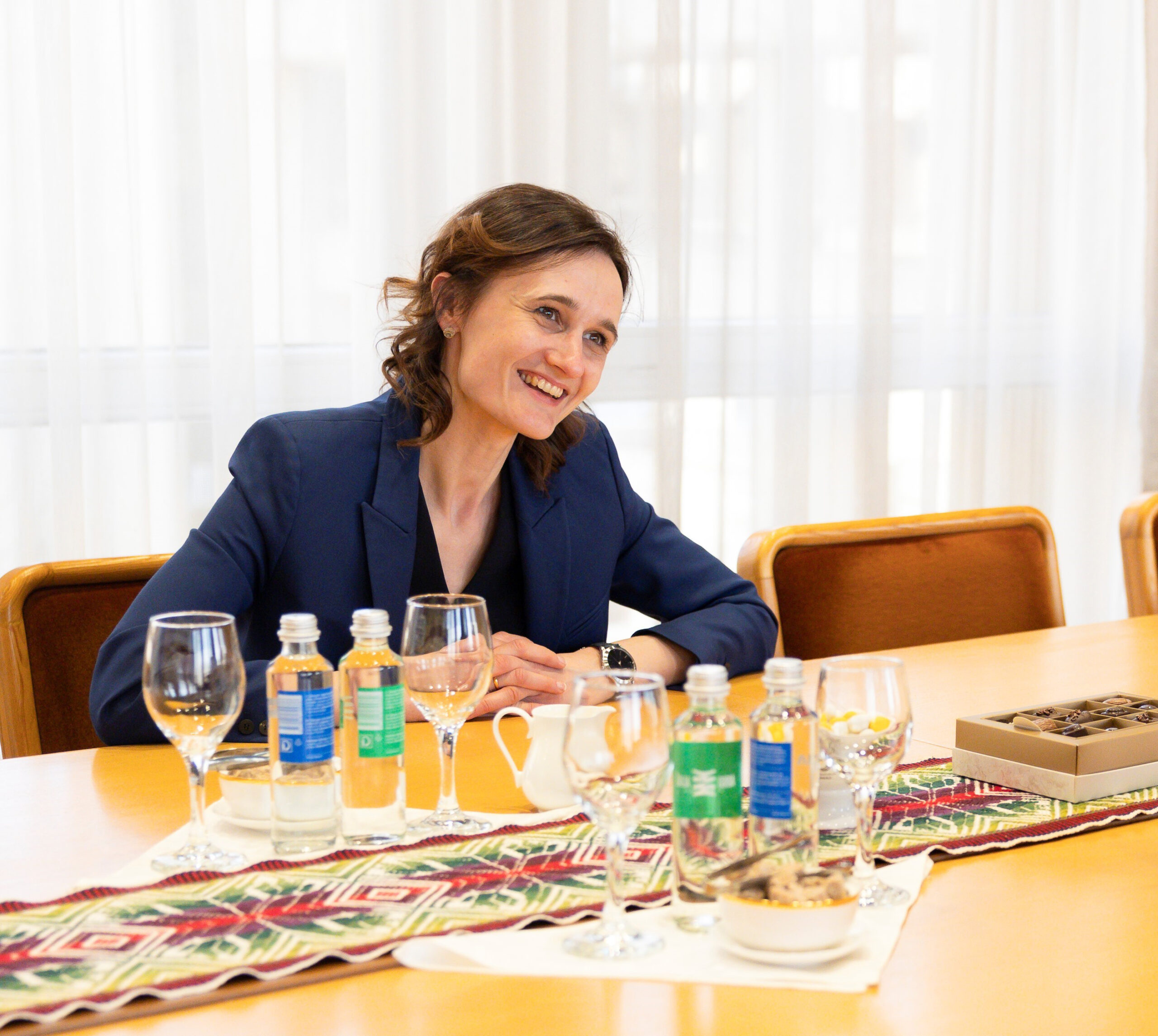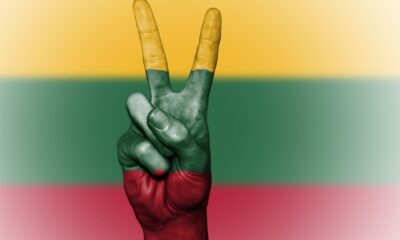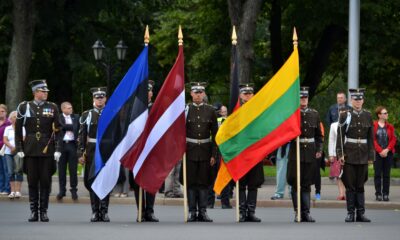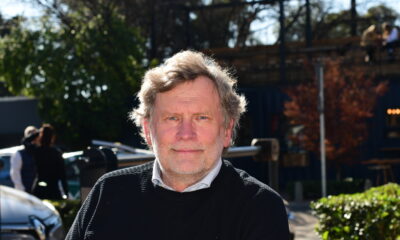
Banner

Lithuanian government vows to tackle obstructions to SA Litvak citizenship
Published
12 months agoon
By
Peta KrostThe Lithuanian government is openly encouraging South African Litvaks (Jews of Lithuanian descent) to claim Lithuanian passports if they are eligible to do so, however the Lithuanian migration department is making it increasingly difficult.
Lithuania’s speaker of parliament, Viktorijos Čmilytės-Nielsen, told the SA Jewish Report that it was a symbolic gesture on the part of the government that, she said, “cares about historical memory and justice”. She said it was also done to acknowledge “our Jewish compatriots, those people who helped created Lithuania and were then forced to move, sometimes trying to escape mortal danger”.
Lithuanians aren’t allowed to have dual citizenship according to their constitution, which is very strict on this, according to Čmilytės-Nielsen. If a Lithuanian wants to apply for another passport, they have to give up their Lithuanian citizenship. This ancestral citizenship is an exception to the rule, which is for obvious reasons not always welcomed by Lithuanian nationals.
However Čmilytės-Nielsen said there was consensus in parliament about the Litvak ancestral citizenship because, though they “cannot fix the injustices of the past”, they can make a “symbolic but nevertheless important move toward healing the bonds”. She said that this was “impossible to do without acknowledging the painful past”, which she says the government clearly wants to do.
She was referring to the history of the Jews in Lithuania.
At the beginning of 1941, there were between 225 000 and 250 000 Jews in Lithuania and most of their families had been there for centuries. In fact, there was such a Jewish presence in the capital, Vilnius, that Napoleon called it “Jerusalem of the North” when he passed through in 1812. In 1941, there were 60 000 Jews living in Vilnius alone, making up 30% of the city’s population until they were murdered that year.
Jews at the time made up close on 10% of the population, and in some towns they represented more than 50% of the townsfolk. It was shortly after the Nazis invaded Lithuania in June 1941 that mostly ethnic Lithuanians implemented the Nazi’s systemic murder of Jews.
By November of that year, most of the Lithuanian Jews had been shot, killed, and thrown into pits in about 200 sites around the country.
Today’s Lithuanian government, according to those the SA Jewish Report spoke to on a recent visit to Lithuania, is making it clear that it wants to do what it can to reconnect with the Litvak community.
Rolandas Kriščiūnas, the deputy chancellor of Lithuania and advisor to the prime minister, told the SA Jewish Report that the Lithuanian government “wanted to build bridges”, which is why it was doing all it could to encourage South African Litvaks to take up the offer of applying for ancestral citizenship. He said there were shared histories and deep tragedies “like the Holocaust, which is a big cloud in our current history”.
Kriščiūnas said, “for me, it is impossible to understand how this was ever possible, especially just 25 years before I was born.
“I know there are those in Lithuania who try to avoid, not ignore, this uncomfortable truth, but they can’t deny it,” said the deputy chancellor.
But, as committed as the members of government are to Litvaks reclaiming their historic citizenship, the process through the Lithuanian migration department has become stilted and increasingly difficult.
In fact, many South African Litvaks are being prevented from being able to restore their ancestral citizenship.
For many Litvaks, recent bureaucratic changes introduced by the migration department prohibit them from being able to use the same documentation their siblings used to prove their right to Lithuanian passports.
“We are faced with unrealistic expectations in providing proof,” said one person whose siblings have Lithuanian citizenship.
“There seems to be no end to the additional requirements they expect of us. I mean, we are having to double apostle documents and even that doesn’t do the trick,” wrote another. People ask not to be named as they are concerned this may impact on their getting their ancestral citizenship.
“Requests for additional evidence for identical claims are ridiculous because the citizenship law remains unchanged, in fact, it was made more straightforward in the past few years,” said one lawyer dealing with these applications. “In some cases, the documents are acceptable, but in others they are clearly not.”
It seems to depend on which desk the application lands.
The SA Jewish Report spoke to Remigijus Stankevičius, who represents the migration department, who insisted there was nothing untoward about his department’s dealing with Litvak ancestral citizenship applications. “Our department has to ensure that we allow only those who are eligible to get citizenship,” he said.
However, Dalia Asanavičiūtė, who chairs the parliamentary commission dealing with the world Lithuanian community, admits that there are apparent obstacles placed in the way of restoring citizenship.
Asanavičiūtė was instrumental in initiating the improvements to the Law on Citizenship in February 2022 that made the application process smoother.
“There were laws that enabled Litvaks to reclaim citizenship, but somehow it was corrupted and obstacles put in the way,” she said. “So I did what I could to get the obstacles out the way and the unanimous amendments were made. Unfortunately, somehow these obstacles have come back. However, these problems are not in the law itself, but in the migration department. We’re trying to rectify it bit by bit.”
Asanavičiūtė said she believed it was important for Litvaks to reclaim their citizenship and ties with Lithuania. “Please take home the promise of the Lithuanian government’s commitment to the South African Litvak community. We’re truly sorry for what happened here, and want to prove the goodwill of our government to you.”
She insisted that where there were frequent problems that needed ironing out in reclaiming citizenship, the Litvak community need to communicate them to the Lithuanian government.
The deputy chancellor agreed that the government wanted to solve these problems. “It’s important for us to know what these problems are so we can fix them. Our political will should be proof that we really want to solve them,” he said.
Čmilytės-Nielsen also said it was valuable that these problems had now been brought to parliament’s attention. “We can keep an eye on how the laws are implemented, and make sure the intention of what we are doing in parliament is working in practice,” the speaker of parliament said. “We can also have the process analysed and see where these blockages are that should be removed. Perhaps there is some kind of system on the lower level that can be slightly altered to run smoothly,” said Čmilytės-Nielsen.
The South African Jewish Board of Deputies (SAJBD) recently sent a letter to numerous members of the Lithuanian government calling on them to iron out these problems.
“We see these passports as a part of the healing process”, said Zev Krengel, SAJBD vice-president. “The truth is that if Jews had been treated well in Lithuania, we would never have left.”
He hopes that the Lithuanian government will ensure that the glitches in the way of Litvaks getting their Lithuanian passports are removed, which is why the SAJBD sent a letter in this regard.
He said he believed there were many Lithuanians who are frustrated that Jews are getting passports and they cannot have dual passports. “I can understand this, and believe that as a European country, they should be able to.”
He pointed out that Litvaks also need to play their part in the healing process by “understanding more about Lithuania, seeing where our forefathers come from, and what the country has to offer”.
“Though we hold a lot of pain from what happened to our people there, we cannot punish people for what their fathers did. Healing is essential and anger and hatred prevents healing,” said Krengel.











Peter
May 11, 2023 at 2:07 pm
I agree that the Lithuanian people of today should not be punished for the sins of their fathers. However for any true healing or reconciliation to take place, there needs to be an comprehensive and genuine acknowledgement of the unspeakably cruel mass murder of the Jewish population which once lived in Lithuania and the plundering of their possessions. This was enthusiastically carried out by Lithuanians themselves with little or no direct involvement of the Germans. Without this, the historical realities will continue to fester and generate mistrust and bitterness against current day Lithuanians. A similar situation applies to the many other unrepentant Holocaust perpetrators, collaborators and beneficiaries including Ukrainians, Latvians, Estonians, Romanians, Hungarians, Slovaks, Bulgarians, Belorussians, Croats, Norweigans, Dutch, French, Italians, Walloons and Swiss bankers